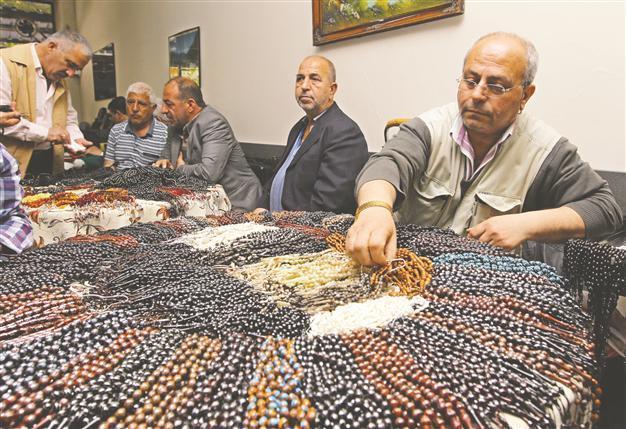Turkish rosaries receive big demand from world
İZMİR / ŞANLIURFA - Anatolia News Agency

A coffee house in İzmir’s Konak has been the best known venue for the rosary trade. Rosary makers display their products on the tables and try to sell them. AA photos
Rosaries are indispensable accessories for some men in Turkey, as well as in many other countries.They are made of materials like tortoise shell and amber, and the ones made of gold and silver are sold at astonishing prices in the eastern province of Şanlıurfa.
Materials like pin, katalin, tortoise shell and camel bone that are imported from China, India, Korea and elsewhere, are processed in various machines and turned into rosary beads.
Most rosaries are made to order and sent to collectors and sellers in the city center, as well as wholesalers outside the city. Their prices change according the quality of their material, and can reach up to 10,000 Turkish Liras. Turkish rosaries also draw big interest from other Middle Eastern countries.
Şanlıurfa Rosary Makers Association Chairman Osman Yeşil said Şanlıurfa was the leading Turkish city in rosary production. He said that more than half of Turkey’s rosary needs were met in the 25 ateliers in the city, adding that the material used in rosaries was very important and that collecting some materials took many years.
Yeşil said buyers were very careful about the quality and workmanship of rosaries, and the production of a rosary sometimes took many weeks.
“We bring materials for rosary from abroad and process them in ateliers. Both locals and foreigners buy those rosaries, especially in the Gümrük Han, a popular place for tourists. We also send them to cities like Istanbul, Ankara and İzmir,” he said.
Rosary makers gather in coffee house
A coffee house in İzmir’s Konak neighborhood has been a very common place for rosary producers and aficionados from all around Turkey for 20 years.
The Seyitoğulları Kıraathanesi is a unique coffee house, being the best known venue for the rosary trade. Rosary makers display their products on the tables and try to sell them.
Speaking to Anatolia news agency, the owner of the coffee house, Engin Tanrıkulu said coffee houses generally made people think of card games, but that his coffee house was known for its rosaries.
“Producers from all around Turkey come to our place to promote their rosaries. There are coffee house like us in various provinces, but we are the only one in İzmir. We have regular customers who have been buying and selling rosaries for 20 years. Prices begin at 5 Turkish Liras and can go up to 100,000 liras according to the raw material and labor. It is possible to access all kinds of rosary through our place via producers,” he said.
One of the regular producers in the coffee house, Abdullah Gündüz from the eastern province of Erzurum, said he was jet manufacturer. “Rosary aficionados in Turkey know me. It is possible to see rosary made of jet in the hand of businessmen and artists, as it is known to reduce stress.”
A wholesaler from Istanbul, Ömer Kızılsu, said he sold rosaries made of camel bone, buffalo and coach horn, which he imported from Egypt every month.
As for regional differences in people’s choice of rosary, Kızılsu said, “Microtome rosaries, which look more polite, are in demand. Older people in Anatolia in particular prefer large rosaries.”
















